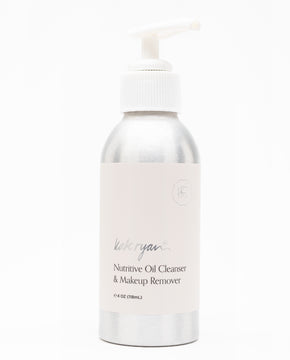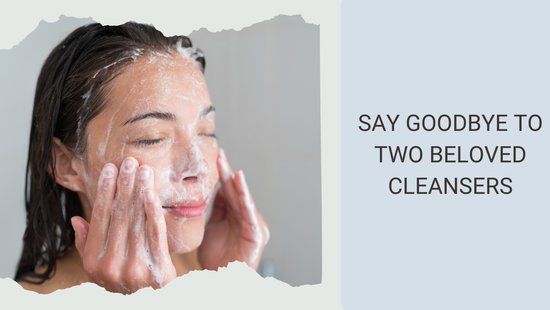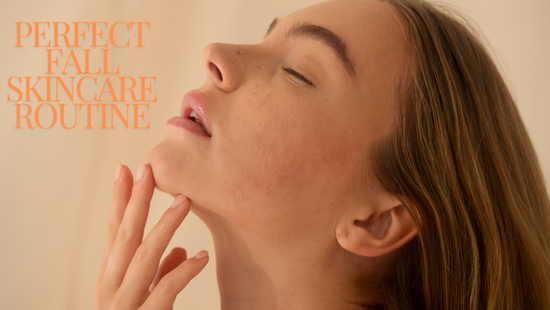“Ah, good. This skin product says it’s pH-balanced! Whatever that means, it’s probably a thing I want!” Ever had this thought while shopping for skincare? You’ve likely heard the term “pH-balanced” many times in reference to personal care products, especially cleansers for face and body. But what does it mean? Balanced between what and what? Why does pH matter anyway?
Well the answer is optimal pH matters quite a bit, and we’re going to explain why it’s an essential factor in your skincare routine for beautifully aging and clear, calm skin.
What is pH?
Let’s get a little science-y before we talk about health and beauty benefits. The term “pH” stands for “potential hydrogen,” that is, the amount of hydrogen ions in any given solution. This coincides with the acidity or alkalinity of a substance on a scale of 0 to 14. The most acidic end of the scale is 0 while the most alkaline end of the scale is 14. Ok, let’s get to what this really means for achieving beautiful skin — the the important stuff! Of course, it starts from the inside out, so we’ll start there too.
How does pH affect our bodies?
Water falls right in the middle of the pH scale at 7, meaning it’s perfectly neutral. Why is that great news for our health? It turns out, our body’s healthy internal pH is close to 7.4, which is no surprise since we know that the human body is about 60% water in adulthood. That’s why drinking plenty of water is so important to maintaining a proper pH in the body. It’s the first defense against an overly acidic environment internally.
When the body becomes too acidic, you may be more prone to illness or infection. You may also experience nutrient deficiencies as the body attempts to correct the acidity by drawing alkalizing minerals from bones and other mineral-rich parts of the body.
Consuming plenty of fresh fruits and vegetables that deliver alkalizing minerals like magnesium, potassium, sodium, and calcium will also contribute to keeping the pH of your body in balance. Avoiding foods like sugar, processed and packaged foods, and excessive amounts of protein will prevent acidity too.
Keeping the body just slightly alkaline via a healthy diet and plenty of water will help support your most glowing complexion, one of the many signals your body is getting what it needs to stay vibrantly healthy.
Why is pH balance so important for skin topically?
We know the pH of the body internally is about 7.4, which is why we commonly hear about the importance of alkalinity for our overall health. However, the exterior of our body, our skin, has a dramatically lower pH when it’s in its healthiest state. The pH of skin is generally found to be 5.5. But our skin’s natural sebum, secreted enzymes, and the activity of healthy bacteria that populate our skin, if allowed to remain intact, can actually bring the pH of skin down to as low as 4-4.5! Everyone is a bit different due to unique body chemistry but will usually fall somewhere between 4 and 5.5.
This acidic layer on healthy skin is called the acid mantle. Think of the acid mantle as a protective shield. Its combination of moisturizing oil, and pH-lowering flora, acids, and enzymes keep skin calm, comfortable, hydrated, and glowing, and will act as a barrier to prevent harmful bacteria and other germs we come in contact with from over-populating or contributing to skin conditions like acne or fungal infections.
So the claim “pH-balanced” in skincare usually indicates the product has been pH-adjusted to be more neutral or align with the expected skin pH of 5.5. While alkalinity may be supportive of our internal health, our skin thrives in a slightly acidic state.
The trouble with soap
Let’s talk about soap and alkaline cleansers, one of your skin’s potentially greatest foes. The way most soap works is to break up grease and dirt via sudsy surfactants that tend to be alkaline, sometimes extremely alkaline. But these cleansers are not selective in what they pick up and dissolve. Along with the dirt, debris, and excess oil, they also take your good bacteria, natural hydrators, protective acidity, and enzymes and sweep them away with everything else. Have you ever experienced that tight, “squeaky clean” feeling from a cleanser? Often, that’s the feeling of your acid mantle having been stripped away. So the cleanser you may be using to combat acne or oily skin could potentially leave skin more susceptible to those imbalances instead!
Bar soap usually has a pH of 9 or higher —holy alkalizer, Batman! Even foaming body washes and facial cleansers, if not pH-adjusted, can leave skin’s pH too alkaline, and thus exposed and vulnerable to unwanted invaders. They can also destroy your skin’s ability to hold hydration, which can either leave dry skin feeling drier, or can cause oily skin to feel both dehydrated and too oily at the same time as excess oil is pumped out in an effort to rehydrate skin. For some people, excess alkalinity could cause a reaction or sensitivity as well.
Alkaline cleansers can even make your skin less receptive to your leave-on treatments like toners, serums, and creams. Those topicals are more likely to have a pH closer to your natural pH, but if your cleanser has already thrown your skin out of whack, it creates a challenge for those products to be effective, and it could increase the likelihood of irritation from them since they’re being applied to skin that’s been stripped of its protective acid mantle and healthy oil barrier. In fact, skin that’s constantly too alkaline has even been shown to age faster due to collagen being broken down by certain alkaline-activated enzymes. Fear not, this is totally avoidable with the right type of care for your skin.
Five signs your acid mantle may be compromised:
● Squeaky clean, tight feeling after cleansing
● Dry skin, dehydration, or initial dryness followed by excess oil
● Irritation – redness, itchiness, scaly, or flaky skin
● Constantly sensitive or fragile skin
● Quick plateauing of results from your skincare products
Proper pH — how to get it and keep it
Ever wonder why treatments like glycolic, lactic, or salicylic acid can deliver such dramatic results to the skin? Their lower pH tends to help correct alkalinity while improving cell turnover and dissolving debris and dead skin leaving it brighter and smoother. Peels and other intensive acid treatments aren’t for everyday use though, so your daily skincare needs to take a more moderate approach in order to avoid over-processing the skin with too much acidity.
How do you know if your products are in the right range? If you’re a beauty nerd like us you can use litmus paper strips to test the pH of most water-based solutions at home. But alternatively, you can look for “pH-balanced” products or inquire with a company about the pH of their products. Remember though, a product may have a proper pH without being labeled “pH-balanced” and your skin might even do best with a pH a bit lower than a product labeled with that optional buzzword.
We make it a lot easier at Kate Ryan Skincare. All of our products (except non-pH oils) are formulated with a pH at or a bit lower than the ideal pH range of 4-5.5 for the skin. This prevents excessive acidity (over-exfoliating) or alkalinity (stripping the acid mantle) in order to help maintain your skin’s equilibrium. With a healthy acid mantle intact, you’ll probably notice that your skin starts to feel a bit more self-regulated. There’s nothing better than waking up in the morning and feeling like your facial routine is almost optional because your skin still feels calm and radiant from the night before.
We ensure maximum performance from all of our products by formulating each product uniquely based on both the pH that the particular active ingredients will perform best at and the preferred pH range of skin. That means no guesswork for you, just gorgeously glowing skin.
Shop all Kate Ryan Skincare products by your personal skin concerns with confidence in their optimal pH here including our popular Salicylic Cleanser featuring salicylic acid in just the right amount for daily use by most skin types to brighten, clarify, and smooth skin’s appearance. Balance is beautiful.
Have more questions about pH or the best regimen for your particular skin type? Connect with us at hello@kateryanskincare.com. We’re here to help!






